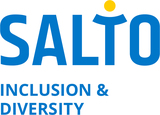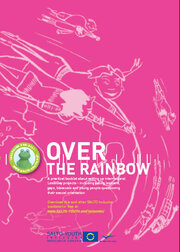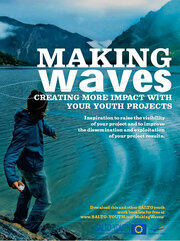Making the most of your LesBiGay youth project
- Find this and more in the SALTO Inclusion for All booklet: Over the Rainbow
- More about increasing the visibility and impact of your project in SALTO's Making Waves booklet
The aims you set out in the beginning in the Planning & Defining stage should remain your primary aims and the focus of your project, however if you have some time and energy to spare, you the youth worker, together with the participants, could go that one step further with your project and create a little change in society with your project:
Positive image building
The first question you must ask yourself is what a positive image is? This discussion frequently arises regarding Pride parades. Some people are of the opinion that homosexuals should behave "normally", meaning that they should conceal any external signs of their homosexuality, by either not being too feminine or too masculine, as the case may be, and by not showing any signs of affection in public, etc. Other people, however, are also of the opinion that homosexuals should behave "normally", but in so doing imply the exact opposite i.e. that each and every one of us should behave however we feel comfortable with.
The issue at stake here is probably how to change or refine the image that "society" at large has of LesBiGay people. You as a group can of course help this process by changing the image that people whom you meet during your exchange has of homosexuality. It is probably worthwhile giving a diverse image of homosexuals and bisexuals in order to refine the stereotypes people hold when they encounter a gay or a lesbian. Chances are that you will have a cross section of different people in your group.
- It is possible to challenge people's stereotypes through your project, not through intensive brainwashing but by taking the opportunity to interact positively with people.
If you want to avoid that people form stereotypes about LesBiGay people, then you should perhaps be conscious of the effect that the activities you undertake could have in stimulating these stereotypes.
Change flourishes best in positive soil.
Positive experiences ensure that people change their attitudes more quickly. Stereotypes are often created due to the fact that some heterosexuals may never have come into contact with a lesbian, gay or bisexual. The obvious way to deal with this is to create positive contact between these people and LesBiGays, giving them a possibility to talk and learn from each other.
^^ top ^^
Breaking heteronormativity and countering heterosexism
Heterosexism, the assumption that everybody is heterosexual, may not be a major problem in a LesBiGay group, but you may experience it at some stage during your international exchange. Since you are travelling in a LesBiGay group, and trying your best to change people's stereotypes, you might decide to undertake some of the following as a group in order to make people think about their attitudes.
- Consciously and persistently use neutral language (e.g. partner instead of wife/husband) or use both genders (e.g. boyfriend/girlfriend, he/she, etc.)
- When giving examples of situations make sure that you include examples of different genders, sexualities or family compositions
- When giving out information leaflets, ensure that each and every person receives the gay, lesbian, straight, bisexual and transgender information
- Counter derogatory comments or jokes
- Create awareness about different norms in society
- You can find a list of intercultural simulation games in the SALTO Toolbox for Training and in the Training-Kit on Intercultural learning at www.SALTO-YOUTH.net/Toolbox/ or www.training-youth.net
It is also wise not to fall into the other extreme of homosexism...
^^ top ^^
Make the headlines with your LesBiGay project
You may have an issue to address or a need that requires some attention. If all goes well your project will address this issue. But you could also gain some publicity with the work that you are doing by attracting the media's attention to your project and your organisation. If you are doing a good job, then why shouldn't you let other people know about it!
The process involved in attracting the media's attention begins long before you have something interesting to tell them. First of all, you need to decide on the message you want to put across as well as ways to make it appealing to the media. You must also draw up a list of media contacts that you can use. Try to find out who is responsible for the type of story you want to relay. In any case, ask the young people in your group if they would consent to being photographed or filmed.
Some hints in dealing with the media
- Think original: do something new, different, innovative, creative, e.g. a live chain of LesBiGay youth around the town hall; build on the world record for the longest kiss, etc. In some countries a LesBiGay project will already be news in itself
- Think action: your story should have action, life, energy, or movement to illustrate your project e.g. young LesBiGay people parading, dancing, shouting, playing, crying, kissing, etc.
- Think visual: provide images that are sufficiently eye-catching to make the front page or the screen e.g. young people on a globe, wearing masks, kissing, wearing fancy or funny dress, cartoons, etc.
- Think short: make your story digestible for the media; concentrate on the essentials; cut out all the unnecessary detail; think of headlines, etc.
- Think practical: help the journalist to the max by providing ready made articles, press releases, interesting information, quotes, quality pictures, anecdotes, logos, possibilities to hold interviews or take some photos. Give them an information number where they can quickly contact you to ask some further questions, etc.
- Think openly: be prepared to go along with a journalists suggestion, even if it isn't exactly what you had in mind; some news is better than no news!
- Thing current: relate your story to current news events, e.g. the publication of research on LesBiGay suicide, LesBiGays being convicted in a certain country, etc. Try to get your story to the press before it happens.
- Think people: people like to read or hear about human interest, personal stories, dramas or incredible achievements, e.g. a politician that started his activism in a LesBiGay organisation, impossible international LesBiGay relationships, etc.
- Think connection: find a connection to the newspaper or newsletter you want to publish in. News gives preferences to stories that have a link to their audience, e.g. European LesBiGay project in your local school (local newspaper); practical examples of LesBiGay youth work (social workers' magazine), etc. Adapt your story to different target groups.
- Think famous: try to connect a local or national pop star, politician, sportsperson, business person, etc. to your project, organise activities with him or her, have the famous person present at your press conference, etc.
- And last but not least: Think twice! Before you approach the press or lobby politicians we suggest to contact international organisations that are lobbying for LGBT-rights first. Together you can align your media and lobbying work and spread a stronger coherent message. Contact www.ilga-europe.org or www.iglyo.com
- Find out more about working with the media on www.ILGA-Europe.org 's 'Working with the Media' page (under Capacity Building)
^^ top ^^
Go forth and multiply
So you've had a great international experience? Maybe it shouldn't stop with just the few members of your organisation who went abroad. Your international try out could lead on to more spin-offs than you might expect.
The next steps
The international project is only the beginning. The young people that participated in the exchange might well have caught the international bug and want to do it again, and might even want to take on more responsibility next time. You can channel the energy they absorbed from this enriching experience abroad into more involvement by them in the organisation. They might become volunteers and take on different tasks or might even join the board.
- Keep on creating positive experiences for the participants of your youth exchange to keep the energy flowing
- Give recognition to the learning and personal development the young people achieved during the exchange by giving them a certificate, a letter of recommendation, or start up a YouthPass for them (see www.SALTO-YOUTH.net/YouthPass/)
- Think of organising another exchange or international project and find out who would be interested in taking part the next time around?
- Be clear on what could be pathways through your organisation for young people after an international project
- Offer guidance and training to young people who want to get more active in your organisation
- Support them in their choices and their tasks
- ...
Connecting with others
The international LesBiGay youth project may definitely have been an interesting learning experience, but it should not only be the youth workers and participants who went abroad that celebrate it. Remember all the people on the sidelines who supported you along the way: the board of management, those who provided funding and sponsorship, other young people and youth workers in the organisation, the parents, local community, etc.
- Send them a postcard from where you are holding the exchange (don't forget their addresses!)
- Create a daily blog for the people back home, put pictures online (ask permission!), or send regular e-mails to the home front
- Bring a little something from the country to thank those who helped prepare the project (parents, peers, etc.)
- Put together a slide show, exhibition or storytelling evening and give them a taste of what the project was about
- Send thank you notes to the supporters of your event, along with a summary of your report
- Organise an international activity in your organisation so that everybody gets to experience the international connection(s)
- ...
On hearing the stories about the exchange and seeing all the photos of their peers other members of your organisation become stimulated to participate in a similar project. So if it was the case that you didn't find enough interested candidates for the exchange the first time around, you might have to select from a bigger list of candidates next time.
Spread the word...
If you did many interesting things, used a lot of new, exciting methods or reached some conclusions as regards action, it might be beneficial to document them. You will probably have to prepare a report for the funding providers anyway, so why not spend a little more time on it and make it into an interesting publication or a youth work manual. You could use this to show to the outside world the good work your organisation is doing. At the same time, it will help raise your organisation's profile and give more recognition to the work you are doing. You can share the results of your activity in a variety of ways:
- Make sure you take enough 'material' back from your international exchange that would help you circulate the results: notes, pictures, videos, press clippings, etc.
- Develop a seminar report including the results and achievements of your project - to be sent to the funding providers, or to the parents of those participants who give you their consent
- Put together a booklet or a manual from the methods you used or the good practices you exchanged
- If you came to any conclusions or recommendations regarding LesBiGay issues forward them on to the appropriate politicians
- Organise a press conference or a media event (see above) to present your results, your new publication or your political recommendations
- Circulate a newsletter or write an article about your exchange programme
- Document your activity on your website(s)
- Maintain a healthy relationship with your funding providers, by sending them a report or keeping deadlines. You will probably need them again for future projects. Meet with them to present them your results.
- ...
^^ top ^^
Making your work sustainable - share your experiences with other LesBiGay organisations!
Just like you maybe were looking for good examples when starting up your first international project, other organisations might also benefit from your experiences, from your learning, from your tips and advice.
IGLYO (International Lesbian, Gay, Bisexual and Transgender Youth and Student Organisation) provides space at its web-forum to exchange information on international projects. By sharing experiences here organisations can learn from each other's projects, and build on each other experiences. At the same time IGLYO gets input for its political work representing the needs of LGBT young People on an European level www.iglyo.com
If you are interested to get involved in LGBT youth work on an European level after your international project then it is certainly worthwhile to contact IGLYO.
^^ top ^^
- More about increasing the impact of your project in SALTO's Making Waves booklet - about raising visibility of your project and improving the dissemination and exploitation of its outcomes and results
Downloads
The following downloads are available:
- Over the Rainbow - international LesBiGay projects - 2008 update
Inspiration & advice for setting up respectful projects with young gay lesbian bisexual people. Lots of information about project management, finding partners, funding,... Based on SALTO TC Rainbow 2005
- Making Waves - more impact with your projects - 2010 update
Making Waves takes you on a journey to have the biggest possible impact with your youth projects: make them visible to the outside world and document your project results and make them USED by others. Make Waves - Have Impact !




